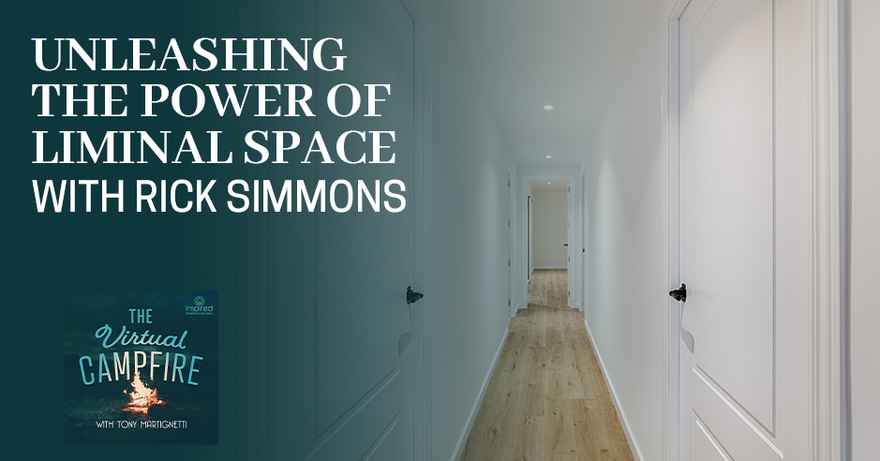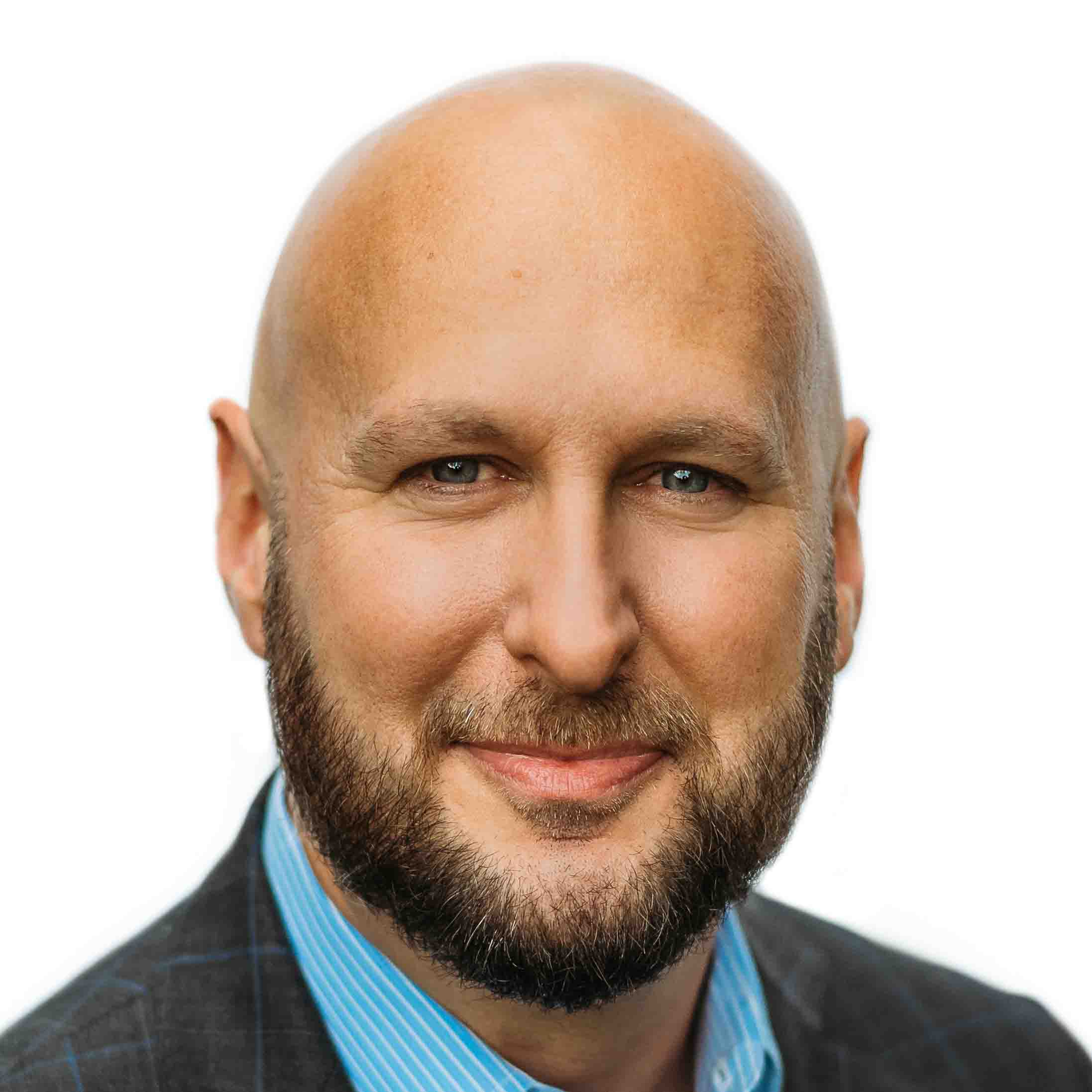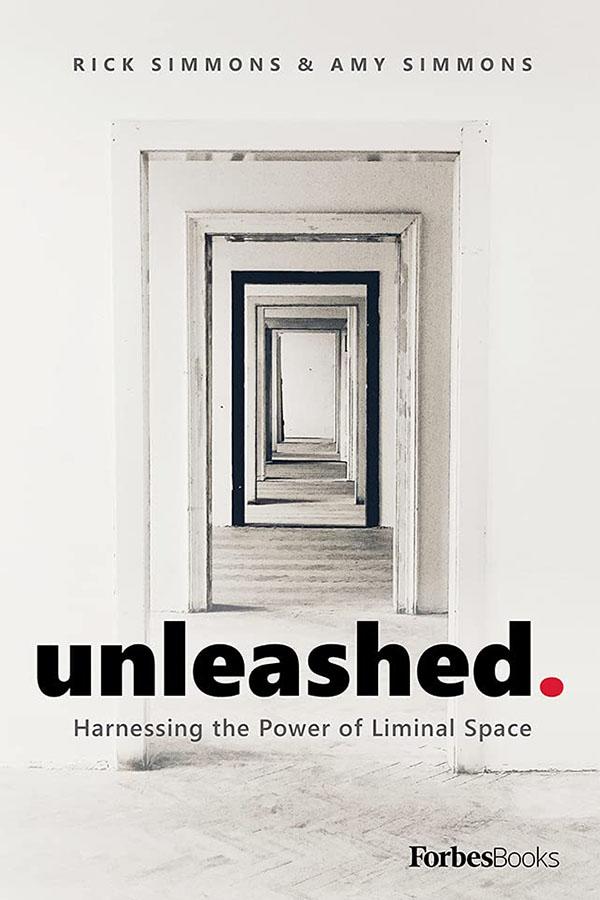Unleashing The Power Of Liminal Space With Rick Simmons

There is power in the liminal space. It is those threshold moments where you’re no longer where you’ve been but you’re not yet on the other side. Rick Simmons, CEO of Telos Institute, talks extensively about this in his book, Unleashed: Harnessing the Power of Liminal Space. He shares some of the most important concepts from that book in this conversation with Tony Martignetti. Rick shares the flashpoints that led him to his journey and making a massive impact on the world. He talks about how raising our attention allows us to see what already existed and enables organizations and leaders to identify opportunities and develop best practices for improvement. Tune in and get insights on how you can make change work for you.
---
Listen to the podcast here
Unleashing The Power Of Liminal Space With Rick Simmons
It is my honor and pleasure to introduce my guest, Rick Simmons. Rick is an experienced coaching and consulting professional with more than a decade spent collaborating with leaders at the highest levels of organizations to optimize their business and live in their lives. He serves as the Chief Executive Officer of the telos institute, a leading global organization consulting firm that he cofounded in 2006. Telos offers specialized expertise to leaders and leadership teams around the world in the areas of business strategy, leadership development, and change management.
In his role, Rick is responsible for shaping the vision and guiding the strategic direction of the firm while inspiring a growing cohort of world-class practitioners to deliver insight, growth, and transformational experiences for telos clients. Prior to founding telos, Rick spent ten years in various senior strategy and sales leadership positions within the financial services industry.
Most notably, he led several organizations through periods of transition, which afforded him the opportunity to share his experience and insight into the best practices for managing personal and organizational change. He is the co-author of the amazing book, Unleashed: Harnessing the Power of Liminal Space. He lives in Cleveland, Ohio, with his wife and telos Cofounder, Amy, and their four children. Rick, it is such a pleasure to welcome you to the show.
Thank you so much, Tony. It is a privilege to be here and looking forward to a great chat.
It has been a long time waiting to get you here, but the fire has started. We are looking forward to having you on and exploring your journey to making such a huge impact in the world.
As with most of us, like you and me, we try to leave whatever positive impression in this world that we can during the time that we are here. Cheers to that.
Success is about creating systems.
As we do on the show, we try to uncover your story through what is called flashpoints, these points in your journey that have ignited your gifts into the world. As you are sharing these flashpoints, you can start wherever you would like and share whatever you are called to share. As we are going on this journey, we will pause on the way and see what themes and themes that show up. With that, Rick, I am going to pass it on to you and I am dying to find out where we start.
In retrospect, it all seems to make sense, but as you go through the journey without the benefit of all the data points laid out ahead, it is hard to understand how it fits together. I suppose I would go back to when I was eleven years old. I wrote a little riff on this topic, which was called Death of the Paper Boy or Paper Girl. So many leaders that I have worked with over the years tell a story of early employment hood. For me, it was having my own paper route. Truth be told, I worked arduously to deliver those papers for the first six months and realized that delivering papers every day early in the morning is hard work.
I had this idea that I could hire two other young people in the neighborhood to break up that route and deliver half the route on a daily basis. I would deliver the papers on the weekend and collect the money from paying customers. I did that for the next couple of years or so. At the time, it did not seem like a big deal, but I think that, in retrospect, that was a formative experience for me. It was my first exposure to capitalism at a micro level. I think it was a recognition of how to be aware of and deploy one’s gifts.
For me, I was certainly capable of delivering those papers every day, but the redundancy of that was not necessarily something that made my socks roll up and down. It was developed in the relationships with customers and creating an infrastructure that allowed them and ensured that they would get that paper reliably every day. It was interesting to me. I would say that was flashpoint one. It was a good learning experience and lit my fire for entrepreneurialism.
It seems like this is one of those moments that most people often think of. It is the early days, the first job, that really led to the spark. It is the working smarter, not harder mentality. I think that is what entrepreneurs are meant for. It is how do you get into the world and create something that can be done easier than what is currently being done by other people?
The second flashpoint for me, which aligns with this, was I was a tenth grader in high school in a computer science course. It was a cold, snowy, sweater-wearing early morning in Northeast Ohio as a high school student. Our teacher at the time, Michael Pollock, laid the quote on us. He said, “Students, the secret to success is a system.” I remember I can see in my mind, even as we speak, Tony, what the room looked like. I remember looking to my right and looking to my left, wondering if my classmates had heard the lightning bolt of an insight that Mr. Pollock had just shared with us. They had not or at least, it did not resonate with them as it did for me at that moment.

I knew at that very moment that I had heard something really formative. Almost every day since, I have played with, utilized and considered this notion that success is about creating systems. Even in that moment, at a very small level, I thought about the system that had been built on that paper route 5 or 6 years earlier. It was the next step in the journey of having had that experience and then intellectualizing it in Mr. Pollock’s class. That was flashpoint number two for me.
I love that because there is something beautiful and simple about that. I think the one thing that has me a little befuddled about this is that. Although I completely believe in it, as someone who is an artist at heart, does it leave any space for creativity? I think I know the answer, but I want to hear from you.
I think there is freedom within fences. I think that products, experiences and conversations that are over-engineered, feel bloodless, soulless. Conversations that have no construction to them whatsoever and are shapeless and formless are, at best, hard to follow, at worst, unfulfilling. I think that having a framework or a system within which we can have spaciousness for serendipity and creativity to come forth is how I like to think about that.
It hearkens to something that I often say to my clients, “Structure creates freedom.” If you put that container, it allows you to know that that is where you can play. I love this so far. Let’s continue on the journey. We were only at ten years old now. We got ways to go.
The first flashpoint at eleven as the paper boy and then as a sophomore in high school, I would fast-forward to my undergraduate experience. I had a university professor, Greg Pat was his name. I think Greg inspired me because he came out of business and industry. He did not take a traditional academic route. Although he was a PhD that he had acquired later in his life, he was rooted and grounded in the rough and tumble of business and industry. I think there was a relevance to him, an authoritativeness to him that really spoke to me.
There was not any moment in time like there was with Mike Pollock, but I think that over the course of my relationship with Dr. Pet, I went into undergrad hoping to be a lawyer. I was studying finance and political science. What Greg introduced to me was the beautiful study of scarcity. By definition, the conundrum an economist faces is the allocation of things, people, money and resources in light of scarce circumstances.
Think less about inventing something new and more about locating something that was there all along.
I had begrudgingly taken some of the higher-level math courses in high school and college but did not understand what to add. I think that this flashpoint with Dr. Pat opened up a world of relevant study and economics, pointed out some of the interests and the language of mathematics, and put it in service of how to effectively reflect time, resources, and financial assets, whatever it was. It lit my fire for that and served as a course correction in my undergraduate studies.
One thing I can already tell from what you have shared is that you have this real drive. I think it comes from a curiosity to constantly be learning. Is that true?
I do not feel like I have any drive that is any different than anyone else. I only have my own lived experience. For one, I do think that I am hungry for meaning making. I think mathematics became another language and tool of interpretation for me to make meaning of the physical world, financial world, and business world around me. I think that did fuel me, Tony.
There is something about that particular part of the business. It is a language that is something that can be has a concreteness to it, whereas if you think about marketing or other areas where it feels a little bit less grounded.
If I can delve into that for a moment, I remember, in my undergraduate studies, learning that in the cost of goods sold model, the largest component of that formula is labor or the human dimension. Whether you are selling widgets or gadgets or you are in a service business, the last time I checked, that is still largely true. In the world nowadays, we have digitized almost everything where we have gone to our respective Zoom corners of the world, labor is still one of the largest components in that cost of goods sold model. We have optimized the supply chain. We have improved productivity.

Our ability to engage and leverage a discretionary level of effort from those people within our business is still one of the greatest opportunities in business and industry. I think that served as the bridge to what I am doing later in my career, which is taking a rigorous financial approach to solving a business problem. It is engaging people in a whole-bodied way for the betterment of everyone, themselves, and the organizations and the teams they work within.
I think it is Lencioni who said something around, “The effective teams are the last known competitive advantage.” If you can get the most value out of working effectively as a team, then you are getting leverage.
I know I used the term discretionary level of effort. For me, that is not an extra unit of our work. It is an extra unit of impact provided within the same number of hours or maybe even less because of that full-bodied, whole-person approach to our work.
It connects back to the beginning of our journey, which was, “How do we work smarter, not harder?” There are some connections to those early days.
We have probably both learned in our work that there is an insatiable miss to sharing one’s gift in the world. When we are able to raise our awareness and identify ways to deploy or share those gifts, we are, we are able to find that discretionary level of effort and impact.
It sounds like we have taken a very intellectual approach to maximizing the bottom line. It does sound that way, but at the end of the day, it is about getting people to unlock their potential. By doing so, we are making an impact on businesses. That is a beautiful thing. I think that is where this all comes from. It is seeing that by doing the work we are doing to get people connected to their gifts, to their purpose, and unlocking their true potential, then what happens is we are unleashing them. It is the way forward.
Liminal space or those points of in-between exists. We just need to find a degree of liminal within ourselves to utilize those precious periods of transition.
Similarly, when I think about the degree of contribution that Amy and I have made to the field of organizational development, human betterment is less about inventing something new and more about locating something that existed and was there all along. This notion of points in time where you are no longer there, but you are not yet on the other side, you are in those threshold moments and the great power to course correct that exists within those in-between stages.
They will talk about having discovered Halley’s Comet. The comet was there all along. We just had to raise our attention. We had to first see it and raise our attention to it. I think the same goes for this idea of liminal space. Those points of in-between existed all along. Can we raise our awareness or attention to them and find a degree of liminal within ourselves to utilize those precious periods of transition?
That is a beautiful term, liminal agility. I loved that. I know it is not the first time I have heard it, but I think it is something that really, for the readers, that is probably the first time they have heard it. I think that is something that is interesting, especially when we are going through so much liminal space. People are going through so much change and they have to navigate. I want to shift gears a little bit here and go through a bit of your journey through change. We have gone from working in finance or working in more of financial space. Tell me about your journey. What were the parts of your journey that led you to doing the work you are doing? Give me some more of those flashpoints along the journey.
I had an internship when I was a senior in college in the financial services industry. It was a real eye-opener for me. At that point in time, if you would have looked back over the many decades that existed in the US financial markets, even on the worst day in the history of the US stock market, there were still hundreds of individual securities that were up at the end of that worst day in history. The competitor in me, Tony, found it interesting about how to win in any environment that financial markets might find themselves in and to be nimble and predictive in ways that would be beneficial financially. I spent the next twelve years or so in various roles in the financial services industry, typically in senior sales leadership roles.
In the last number years of my career, I found myself at the point of transaction, companies that were divesting or making acquisitions. The learner in me became very curious as to what felt like missed opportunities to think more long-term strategically, missed opportunities when I was in the room to ask the next most important question from a leadership perspective or the inability to manage the change that was happening in an entire industry or in a company. When I started asking those questions, the people in the room turned to me and said, “Shut up and go find us another 100-basis points on our EBITDA.”
I did not take that personally, but how I did perceive it was that I wanted to come into the room differently. I wanted to be a source of support for organizations, particularly senior leaders and leadership teams, to be more thoughtful about issues of strategy and leadership and change issues. I launched off on a graduate program that culminated in my research thesis around the return on investment of executive-level coaching and professional service organizations. We had heard this quiet anecdotal rumor, a thing called coaching and these anecdotal stories of its success.

The metric-driven part of me thought, “We ought to be able to measure that.” I spent a few years in graduate school doing just that and walked out with a set of data that indisputably said there are few interventions that have the ROIs of a well-delivered executive coaching engagement. I was at a point in my life and my career at that time where I had this data and then I had this great life. I had a decade-plus spent in the financial services industry, yet I had this data. I think that was a formative point for Amy and I where we burned the boats. We sought to turn a dream into reality. That was many years ago.
When I hear that story, there is something about it that says someone who would not say, “My marker of success is to make enough money to live a comfortable life,” and say like, “That is great,” and uncovered a great, interesting fact. I could turn a blind eye to it and continue to live a comfortable life, but then I would be ignorant to the fact that this could be something bigger. I could be adding value. I could have a legacy bigger than this or I could do something about this.
Choosing that path is one that is not an easy path. I am sure you would say that the many years is not a simple, “Let’s go do this and make it happen.” It is one that is rewarding because it is adding value. It’s seeing around the corner and saying that there is something big that could be created by following this data.
On a more personal level, two filters I used at that point in my life were formative for me. The first one was, I have four children. I tried to pretend as if I was counseling one of the four of our kids as a 35-year-old, thinking about launching a new enterprise in the midst of a pretty successful career. What would I say to them and how might I advise myself through that lens? It was a helpful filter, Tony, to think about what I would most want for them and how it helped me identify what I most wanted for myself.
The second one was I imagined that it was many years later in life. Reflecting on my time, personally and professionally, on the proverbial rocking chair, I became intensely afraid not of having pursued the telos path and failed. I became much more afraid of looking back on my life and my career, wondering if I could have. At that moment, I knew that pursuing it and failing would be far less painful than never pursuing it and wondering, forever and always, whether I could have.
Hearing that and realizing that so many people’s dreams die because they are afraid of making that leap or putting it in that frame. One of the things that you can think about is that, “You can always go back.”
Pursuing a dream and failing would be far less painful than never pursuing it and wondering, forever and always, about what could have.
I remember Amy and me sitting on our back porch. We gave ourselves a very specific timeframe saying to ourselves, “We are mildly employable. If this does not work, we can hopefully provide for our family and feel confident of that.” That “I would rather have pursued it and failed” filter took a lot of the pressure of succeeding off. It was not going to be a character flaw if we had not succeeded. Businesses start and fail a lot of those times. The people that fail are smart, driven, ambitious, and economically subject to bad timing. There are lots of very rational and very reasonable reasons that businesses do not succeed. It took some of the edge of pressure off, not all of it, but enough of it that allowed our shoulders to drop and relax and get us focused on the work we needed to do.
I cannot recall ever hearing from a serial entrepreneur who said that they regretted going through the process of starting a company or taking that chance. Even the ones that failed know they learned.
I never considered myself an entrepreneur. When I look back to that first flash point, in retrospect, I think to myself, “I had those properties.” What might be helpful for someone reading our chat, Tony, is it was much later, even after we started telos, that I tried to understand the psyche of the prototypical successful entrepreneur. She is not a throw caution to the wind kind of individual. He is not the highly amplified cartoon character that we think of as an entrepreneur.
In fact, most successful entrepreneurs view risk differently. They view betting on themselves as a less risky proposition than subjecting their employment status to someone 3,000 miles away with a highly sharpened #2 pencil. They would rather maintain some degree of domain in their outcomes and in their success. I found that interesting. It helped me slip on the entrepreneurial jacket more comfortably because I always felt a little bit outside of that. I had that caricature of what an entrepreneur is. I never really felt part of that. That was helpful.
There was a keyword to that, which is your relationship with risk. That is a big part of why people either do not do or do not choose this path. I think understanding that is an important aspect of whether or not you are willing to go that path. Whether you call it an entrepreneur or not, starting in a new endeavor of really anything is how you feel about risk.
I found myself on panels from time to time, like you, talking about these kinds of things. I think that there has been a bit of a dramatized notion of entrepreneurship. Much like where this conversation started, it is not the deployment of everyone’s gift. It is not the proper deployment of that. I think that being an entrepreneur or not is not better or worse or right or wrong. It is just whether it is a proper expression of one’s gifts. For Amy and me, I would not be on this show if not for the counterbalance set of skills that she very early brought to the table to our dual oversight. I think she would say the same if not for my set of skills as the counterbalance to her. The partnership has been key.

I love that you mentioned it because I was going to go there too. There is this element of everyone sees this lone star rising up and, “I am going to do this all on my own.” In reality, it is never a solo effort, at least not a successful one. It takes a lot of people should come along on the journey to really create that. I am sure you will say that it is not just the two of you who have made this the company it is. It has been enlisting a lot of people along the journey, including people who have supported you along the way.
There is a countless list of names of people that have made spot contributions and ongoing contributions. It is called the telos Institute, not Simmons Consulting. We never aspire for this to be a brand that was an expression of just the two of us. We wanted this to be a community of world-class practitioners showing up differently and helping organizations, teams, and individual leaders drive distinctive outcomes. That is a pursuit that we remain on.
I want to get back into some of the things that make you who you are. We have talked about your story, your journey. What I want to understand is what you think are the biggest lessons you have learned about yourself along this journey that you want to reflect on that you want to share that other people can learn from.
I suppose I will tell one quick story. I was in a long-distance foot race. Many hours into this endeavor, it will not be a surprise that a bit into this conversation, I had a number of the logistics elements finely tuned in. My hydration plan, my calorie intake plan, and various rhythms that I was going to employ throughout the course of this very long foot race. Life imposed itself with temperatures that were warmer than had been planned. I was about halfway through this event, running the numbers in my head, my pace-time, and my goal. I had a crew that was there the whole time. Each hour, they would ask me a set of five questions.
“How are you feeling? What are you thinking about? What has been most challenging? What has been most helpful along the way?” Those were four. The first question was, “What is your goal?” Every hour, you lose the sense of time and space in an event like this. You would not predict when the next set of questions was coming because you were losing a sense of time. I am about halfway in and Amy comes up and says, “What is your goal?” I would typically say, “24 and 100.” I was going to run the whole 24 hours and go at least 100 miles. Those were the base minimum goals. I came around. I knew I was behind pace. She asked me the question, “What is your goal?”
I consider myself a pragmatist, but I am just going to speak honestly. I had what felt like a bit of an out-of-body experience. I watched myself answer in the following way. I said to Amy, “To be okay with me, no matter how far.” I had been gripping so tightly the numbers associated with that event and how it was an expression of me and my preparation and what kind of athlete I was. Halfway in, well behind pace, worn down and in a depleted state, I was able to find my true voice. What I was searching for was for me to be okay with myself no matter what. That, in and of itself, is an interesting story. I think it still stirs emotion in me.
Being an entrepreneur is not better or worse or right or wrong. It's just whether it's a proper expression of one's gifts.
What is really compelling for me is that I then ran the next 12 hours faster than I ran the first 12. I far exceeded that base level goal of 24 and 100. To answer your question, this idea of know thyself is true. Continuing to peel back the layers of that onion is who we are, what drives us, what we think drives us, and then challenging that, questioning that to go down a layer or two deeper, for me, is the gift that continues to give.
I cannot thank you enough for sharing that story because it touches a nerve for me. I am sure for the readers, when they read this, they are going to take away from themselves a lot of what they need to hear. Oftentimes, we hold ourselves so tightly. We are holding on. The reality is we need to let go. When we let go, we are set free. We are able to go even further than we ever expected we could because we have been holding ourselves so tightly, because we think we have to.
The world is conspiring against us every day on Twitter, on Instagram, on Snapchat to capture those high-point micro-moments in time that suggest that that is how life is lived in every moment. It is not. Here is to all those moments.
Maybe you could share a little bit about Unleashed. I have it on my top books, Readers are Leaders in my website. I think that that much of the book is a powerful book. In your own words, I would love to hear a quick overview, more than what you shared earlier because you talked about it a little bit. Tell me more about the book.
Amy and I never aspired to be authors. Years ago, I worked with clients who would, from time to time, say, “How do we learn more about some of these concepts that you are referencing?” I would say, “I do not know,” and then 10 people said that and then 50, and then 100. We are like, “Maybe we ought to write a book. Maybe we should capture some of this thinking more concisely and consolidated way.” We launched off feeling compelled to do it. I suppose defining this idea of liminal space by our terms would be helpful. By Webster’s definition, Liminal is a word that means betwixt or between, a threshold, if you will.
We define it as a period of discontinuity that creates an openness to change, a disproportionate openness to change. I think there is a variable and a base level of openness to change that we all have. We are open for business to a certain degree, but it is these threshold moments. When the snowglobe of life is shaken up, either by our choice, we take a new job, and we move to a new geography, or when it is imposed upon us, the death of a loved one or some other life event that happens. We become disproportionately open to reconsidering the patterns and behaviors in our lives that are somewhat concretized during the normal ebb and flow of our daily lives.
We wanted to write a book that provided some simple frameworks that allow people to prepare for, to fully leverage those catalyst moments, make meaning of them, integrate them, and then sustain that learning either in their individual lives, in the life of a team as they come together. In many cases, an entire organization. We lay that out in the book.
We have some real-life examples of clients and organizations we have worked with who have embraced this notion of how do we infuse liminal agility into ourselves, into our team and into our organization. We hope it is one part of our inspiration to be an awareness-raising tool to help people understand that I can access this renewable resource, which we call liminal space, for my benefit to accelerate my forward progress and provide some tools and techniques to run that course effectively and reliably.
That is why I asked because I wanted to be able to get it from how you best describe this book. I cannot do it justice. I think that was beautifully said. Since we are on the topic of books, I have one last question and that is what are 1 or 2 that have had an impact on you and why?
I cannot not mention Laurence Gonzalez, who was an acquaintance and has become a friend who wrote a series of books. His initial book was called Deep Survival. For both Amy and I, Laurence was a source of inspiration around what happens in these high-stakes life or death scenarios. I would call it a subset of liminal space. How did people respond when an airliner was going down? How did folks respond to the towers on 9/11? There is a disparity in how human beings respond to those situations. Laurence does a compelling and, in some ways, heartbreaking telling of how human beings respond to those stories.
I think that what was really inspiring was that it is not always who you think will come out the other side effectively. Behavior is a part of that. We can affect that piece of it. Laurence, in his books, Deep Survival, is top of my list. Pivoting the other way completely is the Peter Wohlleben book, The Hidden Life of Trees. I am a self-pronounced tree geek. I am fascinated by trees and primarily the idea that every individual tree is subject to the forest that surrounds it. In the ecosystem that is a forest, both the individual trees and the community of trees that exists, I find it really interesting and lots of productive analogies that run back and forth between human systems, teams, and the hidden life of trees.
I have got to put that on my list. It is selfish of me, but I love when people mention books I have not read yet because I add them to my list. I get to dive in. Thank you so much for sharing that. That is really powerful. This has been nothing short of amazing. I do not even know where to start to thank you for coming on the show and sharing all your insights and stories. It is powerful.
I think it says more about the interviewer than the interviewee when good stories are on earth. I felt a warm, sincere welcome to share, and you made that conversational space happen, Tony. My thanks to you.
Thank you so much. Before I let you go, I want to ask where people can find out more about you? What is the best location for finding out more?
Our website is a great spot to learn about what we are up to at the telos institute. TheTelosInstitute.com. You will find information on Unleashed there, our book that you mentioned earlier. We have a podcast under that same name as well. It is also called unleashed. You can get it where you get your podcasts on every platform available. Those are 2 or 3 spots you can learn more about what we are up to.
Thank you so much. Thanks to the reading for coming on the journey with us. I know you are leaving with so many great insights and thoughts, aomething you can take into your own world. That is a wrap. Thank you.
Important Links
- Rick Simmons
- Unleashed: Harnessing the Power of Liminal Space
- Leaders are Readers
- Deep Survival
- The Hidden Life of Trees
- unleashed
About Rick Simmons
 Rick is an experienced coaching and consulting professional with more than a decade spent collaborating with leaders at the highest levels of organizations to optimize their businesses and their lives.
Rick is an experienced coaching and consulting professional with more than a decade spent collaborating with leaders at the highest levels of organizations to optimize their businesses and their lives.
Currently, he serves as chief executive officer of the telos institute, a leading global organizational consulting firm he co-founded in 2006. telos offers specialized expertise to leaders and leadership teams around the world in the areas of business strategy, leadership development, and change management. In his role, Rick is responsible for shaping the vision and guiding the strategic direction of the firm, while inspiring a growing cohort of world-class practitioners to deliver insight, growth, and transformational experiences for telos clients.
Prior to founding telos, Rick spent ten years in various senior strategy and sales leadership positions within the financial services industry. Most notably, he led several organizations through periods of transition, which afforded him the opportunity to share his experience and insight in the best practices of managing personal and organizational change.
Love the show? Subscribe, rate, review, and share! https://www.inspiredpurposecoach.com/virtualcampfire



0 comments
Leave a comment
Please log in or register to post a comment